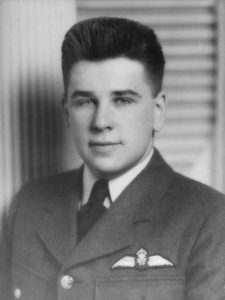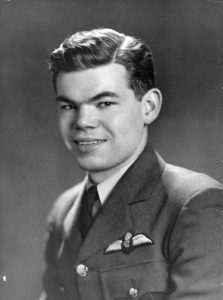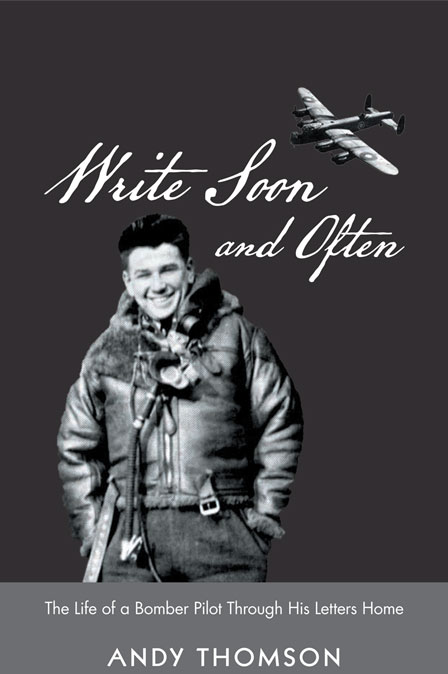WO II Donald Cameron Plaunt
Remembrance Day for me has always meant honouring my uncle, Donald Plaunt. He died on March 12, 1943, two months shy of his 21st birthday, piloting a Lancaster bomber over Essen, Germany. This year I will also be remembering another uncle, Murray Thomson, who died this spring at the age 96. He, too, was a RCAF pilot but hostilities ended before he saw action. As it turned out, the war had an lasting impact on him; he spent the rest of his 75 years devoted to peace and humanitarian work. That, too, is worthy of being honoured.
Murray McCheyne Thomson OC
They shared some notable comparisons. Each was born in 1922 to large families. Because both were the second youngest in his family, they received lots of special attention. They grew up, however, in vastly different circumstances. Murray was born to missionary parents in Taokow, Honan, a rural Chinese community that experienced warlord battles, roaming bandits and starving peasants. His parents’ work concentrated as much on trying to relieve their charges from starvation and war, as on religious conversion. Donald, on the other hand was the son of a successful lumber entrepreneur and was the beneficiary of his father’s largesse. Both spent their school years in boarding schools but spent their summer vacations with their families: Murray at Peitaiho Beach, China on the Pacific Ocean, and Donald in a remote saw-mill village, north-west of Sudbury, at a CPR stop named Wye.
Both cherished a strong connection to their families. From a young age, Donald was a prodigious writer, keeping in touch with his siblings and parents. The 150 letters he wrote to his parents after enlisting were kept in a golden Florentine box, a precious memorial of their lost son. It was through these letters I came to know him. Murray started writing at an early age once he left for school. Later he was to turn this skill into more formal works, writing books on disarmament, Minutes to Midnight, a biography of his father’s work in China, A Daring Confidence and editing a collection of his mother’s letters in Mother God Bless Her.
But beyond all their talents, what made them special to their family and peers was their infectious charm. They were simply fun to be with. Each had a devilish sense of humour. As a ten-year old Donald wrote to his sister Helen: ” I made three mistakes in spelling bute don’t let that weorry you nether” while at 17, he teased his younger sister Jean on her 16th birthday, “… you certainly have them buffaloed on that old adage, ‘and never been kissed’.” I can’t recall any of Mo’s early humour but he was deadly with puns. At my father’s 70th birthday he roasted him with a limerick: A budding young doctor called Mac, First practised his art in Levack, Where a cute nurse named Plaunt, Her attractions did flaunt, And caught Mac, in a shack, in Levack.
Both boys were active and excelled in diverse activities. They loved sports and played on their school teams, Murray, in basketball, Donald, in hockey. As well, Murray played the violin, while Donald followed his early interest in the military by joining a community cadet corps at 11, and then rose to the rank of Second-in-Command of his high school corps.
Despite their deep family roots, each was keen to explore beyond their home base. For a sixteen year-old, travelling to Europe in 1939 was unheard of, but Donald’s decision to take a school trip indicated his curiosity about the world. He soon learned hostilities were coming as he witnessed preparation for war in every country he visited. Murray was also an adventurer, more because of his family situation, travelling back and forth across perilous oceans, but also because of the line of work he chose. His humanitarian work for CUSO, the Friends and the United Nations took him to several North American cities – New York, Toronto, Ottawa – as well as far flung places in Asia – Bangkok and New Delhi.
Murray and Donald were exceptional leaders. As mentioned, Donald was 2 IC of his high school cadet corps. Once he was selected to pilot the Lancaster he became the ‘Skipper’ of a seven-man bomber crew. He took his responsibility seriously as he knew the lives of his crew depended on his ability to fly and make critical decisions. But he left room for generosity. When he learned that the daughter of a crew member was going to have a sparse Christmas, he wired his mother to “SEND XMAS BOX FOR THREE YEAR GIRL FOR MY GUNNER.”
Murray’s legacy of leadership was honoured by the highest awards a country can give: an Order of Canada and the Pearson Peace medal. He never stopped keeping peace and disarmament up front. Among a myriad of initiatives, he co-founded Project Ploughshares with Ernie Regher. He actively worked until his death with two other Order of Canada recipients, Douglas Roche and John Polanyi, to enlist other Order of Canada members to support their petition for nuclear disarmament. At Murray’s death they had gathered 1,034 signatures.
Although their fathers were on the opposite end of the financial spectrum they shared a serious social concern : the consumption of alcohol among young people. Murray’s father was so concerned he wrote a book entitled Alcohol or Christ while Donald’s father offered his son an incentive of $500 if he didn’t drink or smoke until he was 21. Several months prior to Donald’s death, his father bought him a war-bond knowing his commitment was firm. While all his buddies were out at the pub, he was writing letters in his Nissen hut.
If their father’s vocation determined their families livelihood, it was their mothers who provided the family glue, and these poignant reflections of their sons. After Mildred Plaunt learned of her son’s death she wrote to her mother: Don’t feel too badly. He lived a full happy life and perhaps accomplished more in his almost 21 years of living than some people do in a lifetime, and if he, and other lads before him, were not ready to go and die, where would we all be? He chose to do this and he did it in his own way. Margaret Thomson penned a equally touching letter to her family in 1944 while listening to Murray and his friend: Finlay (Mackenzie) plays the piano so well and Murray had his violin. I could not help wondering how long it would be before I should hear them play again. But one should not expect the worst to happen. We pray that these dear lads may be spared to have a share in building the new World Peace.
How prophetic!
I am less fortunate, but so proud, for the loss of two uncles who gave so much in the cause of a more peaceful world: one who gave his life to end the war, the other who spent his life to keep the peace.
For a pictorial story of Donald’s life see: http://bit.ly/2AXwFQB




{ 1 comment… read it below or add one }
Wonderful story, Andy..